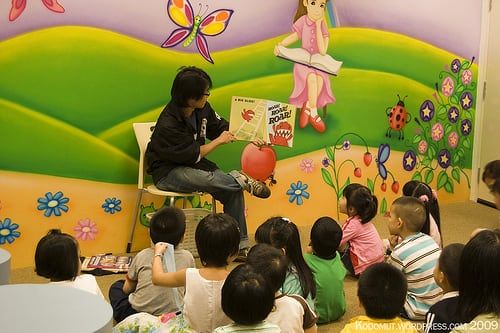The Importance of storytelling
Long before we had access to so much in terms of digital media and technology, books were the source of imagination and the fuel of childhood fantasies. Research in 2012 recently showed growing concern from teachers that the stories children most widely recognise in the classroom are Disney stories (from films rather than books) and indicated that it is characters from television and celluloid that spark the interest of most kids in the classroom. This is such a sad state of affairs, given how valuable storytelling and reading are to the development of a child’s imagination and free thinking.
Storytelling is an important part of childhood for so many reasons. Many children love to read independently but storytelling provides a different dynamic, one of equal importance.
Listening to a Story…
Listening to a story helps develop different senses and fuels the imagination in different ways. Through listening to a story, either at bedtime or school story time, a child is creating visuals in his or her mind without the focus of learning new and sometimes difficult words. Their imaginations are free to roam and they will create wild characters and scenarios from the words flowing into their ears. This is invaluable to the creative thinking process, and can mean that when a child comes to write his or her own story, their memory bank will be filled with different plots, storylines and characters, and the creative thinking process will be easier.
The use of props and different voices will also create an ambience that independent reading cannot. This is important for many reasons including creating strong memories of enjoying books and stories.
Listening to a story being told is a great way to encourage the use of language both written and verbal. When a child hears the use of certain words and the way in which language is structured, they are more likely to strive for this in their own written work and in the way they communicate with speech, this is something that is crucial to literacy levels. Using direct and reported speech is what brings a story to life for children, but it also helps with their understanding of language structure and where best to use certain dialogue.
Storytelling also encourages an increase of vocabulary, specifically because they are hearing words used in dialogue rather than seeing them in black and white on the page of a book. As children listen to stories, they become more aware, not only of new words and where and how to use them, but also of literary devices used by authors to create the feeling of suspense, the feeling of danger and the feeling of adventure.
The Social Benefits of Storytelling
But it isn’t just language and academic values that storytelling books encourages, the social interaction of this time also has an incredibly positive impact on youngsters. Coming together in a group especially in a classroom setting encourages active participation and learning alongside peers. It allows a new world to open up to children and provides the chance for them to share their ideas with each other. This in turn provokes cooperation between students, sharing, active listening and peer communication.
Storytelling also offers time for relaxation especially if the child is in the earlier stages of learning to read. With hearing a story, the child can sit back and enjoy and there is no pressure to get things right. This also increases the child’s willingness to share and communicate their thoughts and feeling, especially if the storyteller opens up discussion around the book that they are reading.
In the home, storytelling sets an example to children that reading is a positive and enjoyable activity. Many children, especially boys, do not have role models in the home that pave the way for reading as an everyday part of life. Storytelling provides important bonding time, opens up dialogue in the home and encourages children to share more with their parents.
By making storytelling a part of a child’s life and showing the importance of independent imagination, a child may be more likely to read independently. Some children do not show immediate aptitude for reading or are not particularly interested. In many cases, these children will benefit from a story time where they can relax and enjoy the pictures coming to life in their own minds and feel a creative flair all of their own.
Image Credit: Kodomut @ Flickr

